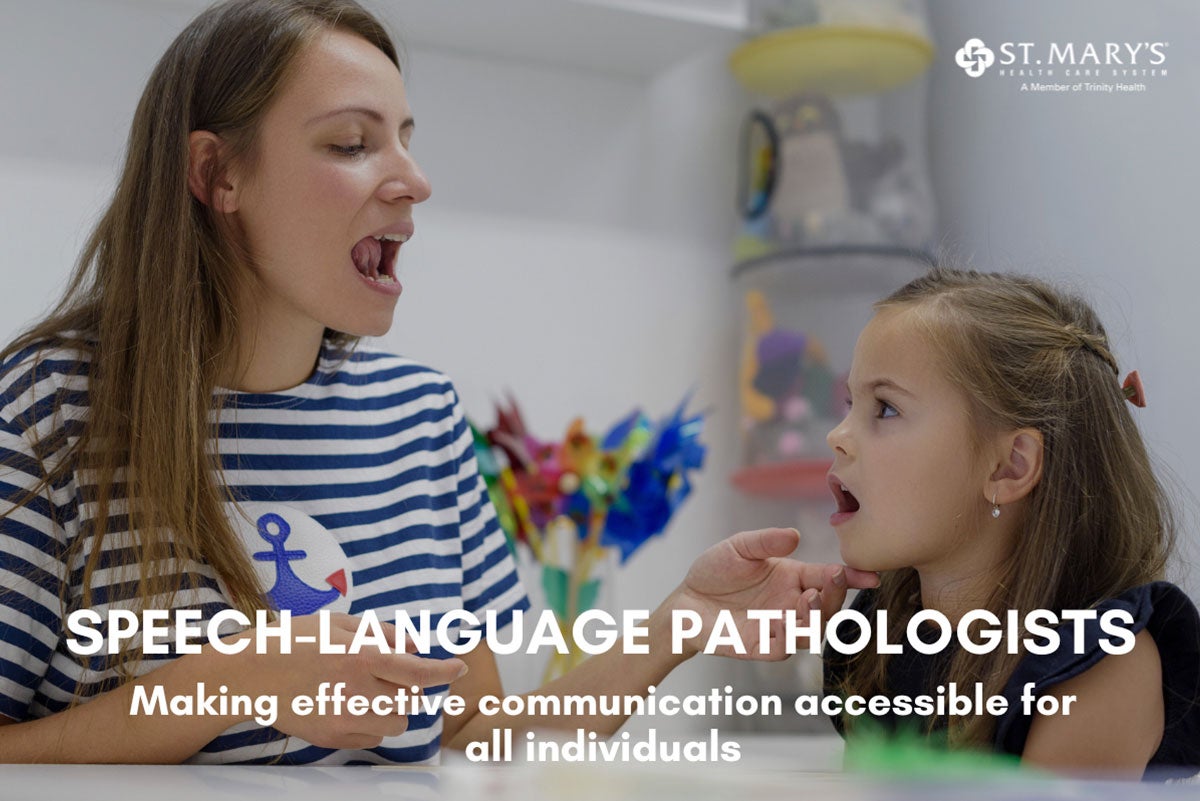How a Speech Pathologist Works with Schools to Boost Student Outcomes
How a Speech Pathologist Works with Schools to Boost Student Outcomes
Blog Article
How a Speech Pathologist Can Help Improve Communication Abilities
Efficient communication is a keystone of personal and expert success, yet numerous people deal with difficulties that impede their capability to share themselves clearly. A speech pathologist is geared up to address these obstacles through targeted assessment and treatment approaches tailored to each individual's needs. By using evidence-based restorative strategies, they not only function to boost speech and language problems however also enhance overall communicative competence. Recognizing the diverse role of a speech pathologist exposes how their know-how can change lives, inviting a better examination of the certain approaches and end results linked with their method.
Comprehending Communication Disorders
Recognizing communication problems is essential for acknowledging how they affect people' ability to reveal themselves and engage with others. Interaction conditions include a wide variety of problems that influence speech, language, and social interaction, typically preventing efficient communication. These conditions can arise from numerous aspects, consisting of neurological conditions, developing delays, physical problems, or psychological problems.
Speech conditions might show up as problems in articulation, fluency, or voice production, affecting just how words are noticable or talked. Language conditions, on the other hand, involve difficulties in understanding or using language, which can restrain both spoken and non-verbal communication. Social communication problems are defined by troubles in the practical elements of interaction, such as taking kip down conversation or understanding social cues.
The effects of interaction disorders are profound, impacting not just the individual's ability to convey feelings and ideas but additionally their social relationships, academic possibilities, and total lifestyle. Understanding of these conditions can promote empathy and support, encouraging reliable approaches for communication and interaction. Understanding the complexities of interaction disorders is an essential step in the direction of promoting inclusivity and resolving the requirements of those impacted.
Duty of a Speech Pathologist
Speech pathologists frequently play a vital duty in treating and identifying communication problems, using a variety of evidence-based strategies customized to each individual's requirements. These professionals collaborate with individuals throughout the lifespan, from children with speech hold-ups to adults recuperating from strokes or distressing mind injuries. Their proficiency incorporates a selection of interaction concerns, consisting of expression, fluency, voice, and language problems.
In therapeutic setups, speech pathologists utilize structured treatments designed to boost communication abilities. They may execute methods such as speech workouts, language games, and social communication training to assist in renovations in expressive and receptive language abilities. Speech Pathologist. Furthermore, they enlighten clients and their families regarding effective communication strategies and adaptive methods to navigate day-to-day interactions
Beyond straight therapy, speech pathologists collaborate with other healthcare educators, experts, and caretakers to make sure an extensive approach to therapy. They advocate for clients by supplying resources and assistance, making it possible for people to achieve their interaction goals and improve their total top quality of life. As professionals in the field, speech pathologists are crucial in cultivating effective communication, promoting independence, and boosting social engagement for those with communication challenges.
Analysis and Diagnosis Refine
The assessment and medical diagnosis process carried out by speech pathologists usually entails a detailed examination to determine interaction problems precisely. This process begins with Website an in-depth medical history, where the clinician collects relevant info concerning the individual's clinical, academic, and developing history. Understanding the context of the individual's interaction difficulties is important for an exact medical diagnosis.
Complying with the medical history, speech pathologists make use of standard tests and casual analyses to examine numerous elements of communication, consisting of speech noise manufacturing, language understanding, expressive language, and social communication abilities. These evaluations are customized to the individual's age and specific issues, supplying important data for evaluation.
Observation is also a critical component of the analysis process, as it permits the clinician to see direct exactly how the private communicates in natural settings. In addition, meetings with family members and educators can provide insight right into the person's interaction difficulties throughout various settings.
When the analysis is total, the speech pathologist synthesizes the findings to identify a medical diagnosis and advise suitable interventions. This thorough analysis process makes certain that individuals obtain targeted assistance customized to their special interaction requirements, laying the structure for reliable restorative strategies.
Therapeutic Techniques and Approaches
Many therapeutic techniques and approaches are used by speech pathologists to resolve a variety of communication disorders successfully. One commonly used approach is expression therapy, which concentrates on fixing speech seems with repeating and visual signs. This strategy is particularly useful for individuals with speech sound conditions.
Another effective approach is language treatment, which boosts both meaningful and receptive language abilities. This may involve interactive activities that advertise vocabulary development, sentence framework understanding, and conversational skills. In addition, speech pathologists typically use social abilities educating to boost pragmatic language capacities, allowing people to browse social interactions a lot more successfully.
Fluency shaping and stuttering alteration techniques are particularly created to aid those experiencing fluency disorders. These approaches assist customers create smoother this page speech patterns and manage the psychological and physical components of stuttering.
Moreover, alternate and augmentative communication (AAC) systems are utilized for individuals with serious communication impairments. These systems, which can consist of gestures, symbols, or digital devices, provide necessary support for effective communication.
Advantages of Speech Treatment

In addition, speech treatment can help in read what he said creating important listening and understanding skills, fostering far better interaction in discussions. Individuals with cognitive-communication problems can also profit, as treatment concentrates on strengthening memory and analytic capacities, important for effective interaction.
One more crucial aspect is the emotional assistance given during therapy sessions. Speech pathologists produce a risk-free atmosphere, encouraging patients to overcome stress and anxiety and frustration relevant to their interaction problems. This support can lead to boosted self-confidence and overall psychological well-being.
Moreover, very early treatment through speech therapy can stop additional complications, making sure that people reach their full communicative potential. On the whole, the advantages of speech treatment expand past mere speech renovation, favorably affecting various measurements of life for those affected by communication difficulties.
Conclusion
In summary, speech pathologists play an important function in attending to interaction problems through assessment, medical diagnosis, and customized therapeutic treatments. By utilizing evidence-based techniques, these specialists enhance people' speech and language abilities, fostering enhanced quality, fluency, and social interaction abilities. The advantages of early intervention underscore the relevance of looking for assistance from speech pathologists, as their know-how can significantly boost communicative potential, inevitably resulting in greater success in both individual and specialist rounds.

Speech pathologists frequently play an important function in identifying and dealing with interaction problems, utilizing a variety of evidence-based strategies tailored to each person's requirements. As experts in the field, speech pathologists are crucial in fostering reliable communication, promoting independence, and improving social involvement for those with interaction challenges.

Report this page